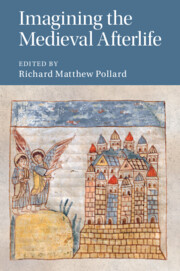Book contents
- Imagining the Medieval Afterlife
- Cambridge Studies in Medieval Literature
- Imagining the Medieval Afterlife
- Copyright page
- Contents
- Figures
- Contributors
- Preface and Acknowledgements
- Abbreviations
- Imagining the Medieval Afterlife: Introduction
- Part I Chronological Surveys
- Chapter 1 Just Deserts in the Ancient Pagan Afterlife
- Chapter 2 Visions of the Afterlife in the Early Medieval West
- Chapter 3 A Morbid Efflorescence: Envisaging the Afterlife in the Carolingian Period
- Chapter 4 The Afterlife in the Medieval Celtic-Speaking World
- Chapter 5 Anglo-Saxon Visions of Heaven and Hell
- Chapter 6 Otherworld Journeys of the Central Middle Ages
- Chapter 7 Visions of the Otherworlds in the Late Middle Ages, c. 1300–c. 1500
- Part II Theological Perspectives
- Part III Artistic Impressions
- Part IV Notable Authors and Texts
- Bibliography
- Index
- Cambridge Studies in Medieval Literature
Chapter 7 - Visions of the Otherworlds in the Late Middle Ages, c. 1300–c. 1500
from Part I - Chronological Surveys
Published online by Cambridge University Press: 07 December 2020
- Imagining the Medieval Afterlife
- Cambridge Studies in Medieval Literature
- Imagining the Medieval Afterlife
- Copyright page
- Contents
- Figures
- Contributors
- Preface and Acknowledgements
- Abbreviations
- Imagining the Medieval Afterlife: Introduction
- Part I Chronological Surveys
- Chapter 1 Just Deserts in the Ancient Pagan Afterlife
- Chapter 2 Visions of the Afterlife in the Early Medieval West
- Chapter 3 A Morbid Efflorescence: Envisaging the Afterlife in the Carolingian Period
- Chapter 4 The Afterlife in the Medieval Celtic-Speaking World
- Chapter 5 Anglo-Saxon Visions of Heaven and Hell
- Chapter 6 Otherworld Journeys of the Central Middle Ages
- Chapter 7 Visions of the Otherworlds in the Late Middle Ages, c. 1300–c. 1500
- Part II Theological Perspectives
- Part III Artistic Impressions
- Part IV Notable Authors and Texts
- Bibliography
- Index
- Cambridge Studies in Medieval Literature
Summary
Visions of the afterlife in late medieval Europe (1300-1500) circulated in collections of saints’ legends and sermons, in religious manuals, mystics’ writings, stand-alone pieces, and literary works. Along with the stories inherited from earlier centuries, there were many new accounts. Together they demonstrate how the medieval Church’s teachings on heaven, hell, and purgatory, as well as on prayers and masses for the dead, on engaging in the sacrament of penance, on accruing merit, on fighting against the demonic realm, and on devotion to the saints, were conveyed to, assimilated, and adapted by the laity. This chapter draws on several categories of these otherworld narratives, including visitations by ghosts, demons, and saints, and explores three primary spiritual dynamics illustrated by the visions:purgatorial ‘transactions of satisfaction’ with the ghosts, spiritual warfare with the demons, and ‘reciprocated devotion’ with the saints. The glimpses of the otherworlds and their inhabitants shored up the religious beliefs and practices of the late medieval laity.
- Type
- Chapter
- Information
- Imagining the Medieval Afterlife , pp. 115 - 130Publisher: Cambridge University PressPrint publication year: 2020

